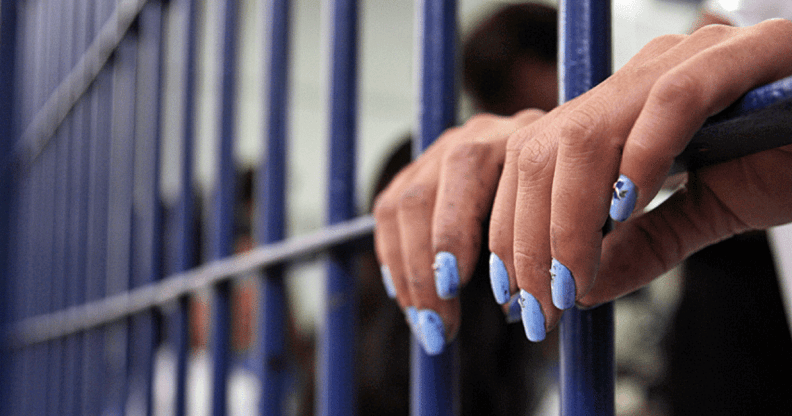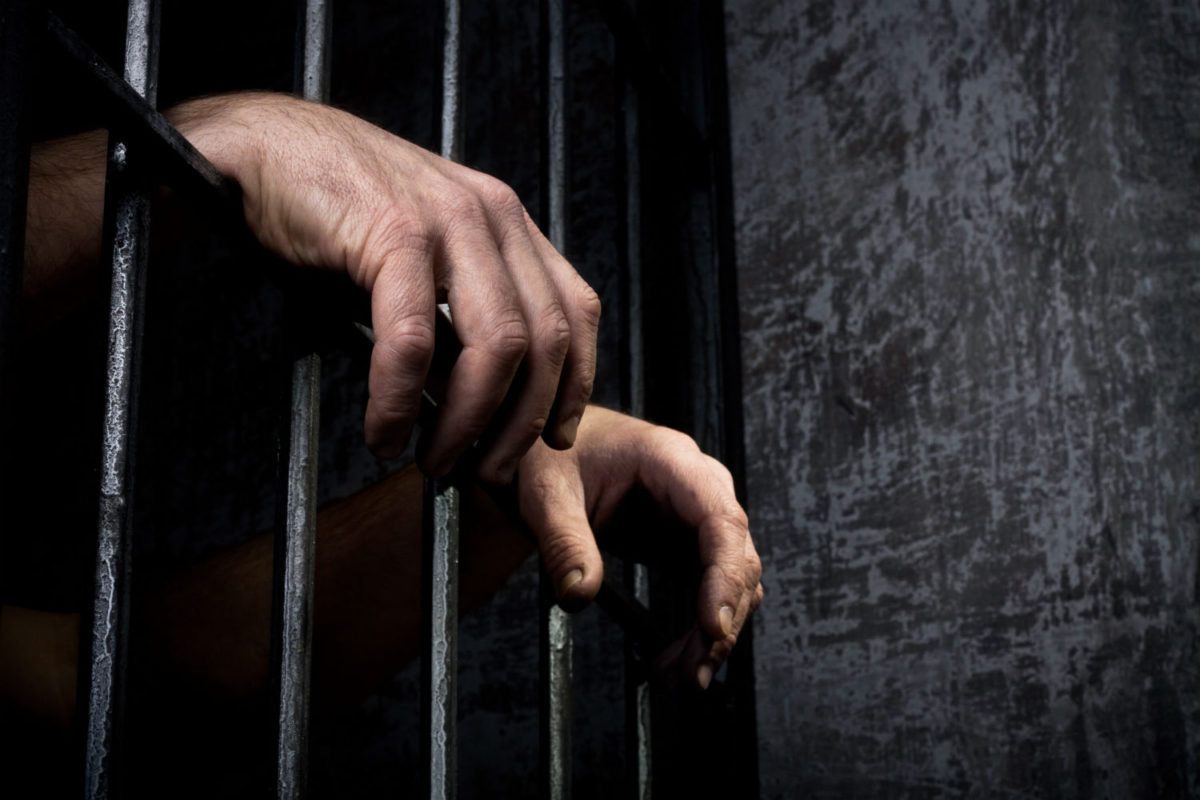These powerful stories from two trans ex-offenders remind us why we need to support trans rights today

Two former trans prisoners have spoken out about their harrowing experiences of transitioning behind bars.
Speaking in the Cholmondley Room in The House of Lords, Karen Lawson and Jasmine Anne Strange shared their impassioned accounts of how they were treated as transgender prisoners, enduring sexual assault, high court battles and being taken hostage in the process of being recognised for their true selves.
Offering their expertise as part of Lord Patel’s Inside Gender Identity report launch, Lawson and Strange told their stories to highlight the need to honour the health and social care needs of transgender people in the criminal justice system.
While a spate of transgender prisoner suicides last year saw a disproportionate amount of offenders take their lives, the 80 estimated transgender prisoners currently in the system are still battling for the right for their identities to be recognised and respected.
Here are Jasmine and Karen’s stories.

Jasmine Anne Strange served a custodial sentence for seven years and four months. She transitioned behind bars, and was subjected to assault and abuse. She now supports other transgender women in prison and helps train prison staff.
I’m an ex-offender. I served seven years and four months in custody. I’m an intersex girl, so for anyone who doesn’t know about it, I was born with ambiguous genitalia. From the age of seven, my father – I’m from a mixed race background – insisted I was to be raised as a boy. So he injected me with testosterone and changed my name, which led me into all sorts of problems, because I couldn’t be the person I wanted to be. I tried to act like a boy, and ended up in prison.
However, because I was very much boyish-looking, going into prison was a bit of a nightmare. The testosterone started to drain out of my system, which led to, as you see today, this nice figure. The thing is, as soon as the prison service knew about it, they didn’t know what to do with me in any shape or form.
I said, look, I just want to move to the female estate. But I never did. After seven years and four months, I was released from a Category A prison; I wasn’t given parole. I lost everything in the beginning, they thought I was going to be a potential sex offender – how that happened when I was going to be in for a robbery, I will never know.
This is the way we were treated back in the day – they can’t understand the difference between gender and sexuality. I’m a lesbian. Just because I’m a woman, it doesn’t mean that I want to sleep with guys. I have done, I didn’t like it.
All my time in custody, it was awful. They treated me in some aspects like a girl when it was right for them. If I was talking to a guy for too long, they’d put me on report, and say it was inappropriate behaviour. I’d say well I’m in a male prison, you won’t move me because you said I’m a boy, because it’s what it says on my warrant! Which way do you want it? The open facility prison was an absolute nightmare. I was sexually assaulted, groped, it was disgusting. It was a double sentence for me. I had to be locked in my own confined space, and I couldn’t enjoy the facilities as any other prisoner would. I couldn’t exercise or go to the library, because I was kept on my own, or with a small band of red band prisoners.
I would just not want to wish the experience I had, all of those years in custody fighting to have this. The women’s team came in to visit me, and they said I wasn’t far enough in my transition to be moved. And I looked down and I thought, okay, right, well if I don’t stand a chance, how does anybody else? But I was a freak of nature in the eyes of a lot of the prison staff. They didn’t know how to deal with me.
There’s a lot of things I’d like to say, but you’d probably leave in tears. There’s things I’d ask for, and you’re not allowed them. I was a bit strong, so I made it through, but other people aren’t as strong, and it’s those people who have lost their lives in custody. People just did not understand them. There were a lot of staff who would take the mick out of us – the staff could be worse than the prisoners at times. I owe my life to the trans community.
We’re not freaks of nature; in my case, I was born with ambiguous genitalia. Does it matter? Does it matter that I’ve lived both sides of the fence? Does it matter that Karen has lived both sides of the fence? We’re human, we have a heart. It beats the same as yours. All we want is to be treated with decency and respect, the same as you would. Whether we’re in custody or not, and that’s how it should stand. A prison officer was dismissed for signing on a piece of paper my deed poll to change my name from male to female. What’s that all about? Why do certain members of staff have to lose their jobs for going against the grain?
My life was hell. I couldn’t do courses, I couldn’t do anything. When I went for my parole board, I was even called a tranny. The judge’s words were “where was this tranny”, and my caseworkers said “she’s sat in front of you.” I got my parole seven days later – what a shocker. But it made hardly any difference to me – it was only eight weeks before I was due to be released. The way they treated me was shocking.
I was also told when I got released that I wasn’t allowed to say anything or I’d be called back into custody. A lot was kept hush-hush; even probation outed me. I went for a course when I got released into the community, and it was an all-women’s course – “ooh probation said you’re a trans lady, so you’re not allowed to do this course.” What’s that all about? Does it matter? I’ve had completion of surgery, which was just my oversized clitoris reduced in size.
That’s all, nothing else, nothing more. It was just because of my father giving me testosterone. I would like everybody in this room who comes across someone transgender to just treat them exactly the same as everybody else. Boy, girl, no difference.

Karen Lawson was the first legally recognised transgender prisoner after enduring a three-year court battle to get her status recognised. She now has a full-time job as a manager and is an active trans rights campaigner.
I was born and raised in a little town called Ballycastle, so that’s Billy Elliot territory. I always knew that there was something different about me but I couldn’t quite figure it out until I was about 10. I came out to my family at that point.
That went down like a lead balloon. So that’s when I started to let out these cries of help, that unfortunately started to take me down the wrong road. I started to get frustrated, angry and wanted to get the help I needed but no-one wanted to listen to me. I got involved with the wrong people, someone took advantage of me and tried to get me to do things for them.
Unfortunately, I got took into custody on April 14 2000. I started living as myself when I was 16, so I went into Forest Bank as Karen, but it was still early days and I didn’t know what to do. I got assaulted, I got knocked out. I then got put down into the segregation unit as an element of protection. I then got moved across to Strangeways when I was an adult. They said until I was 21, they would refuse to help me out. It couldn’t happen in the youth offender estate.
I was given the male uniform, even though I had long hair and I had to wear this beautiful corned beef jumper. There was thankfully a doctor there who was really caring and understanding, and I started on my hormones in 2003.
Obviously, quite a lot of physical changes started to happen, which made me stick out even more. There were cries of “get your tits out for the lads” when I was on exercise. I was also put on the VP wing, which is not the best wing for someone trans. You’ve got all of these lovely guys making approaches. I did get taken hostage when I was at Strangeways, but fortunately, the staff were really good, and one of the staff was a kickboxer. Then they actually created a compact of how my care and management. It allowed me to have at least some of my clothes.
Then the Gender Recognition Act came out. Fortunately with some help from my personnel officer, and obviously, personal evidence of gender dysphoria, I got my gender recognition granted, making me the first trans prisoner within the UK to get a gender recognition certificate granted. When I could turn around to the wing and say I’m now legally female, move me, they really didn’t know what to do.
That still took a three-year high court battle. It took a judge there to say “no, she’s legally female, she needs to be moved in 28 days.” In 2009, I got moved to Holloway. It wasn’t all peaches and roses in the female estate either, but it was great to finally be in that prison with my peers. I didn’t have to wake up and worry about what I was wearing in the morning. Because I’d come from the male estate, there was this supposition that they’d have to take precautions.
For the first three months I was kept in segregation. I was let out on day release visits up to the wing to test how I was getting on. I went to Newhall for four years, and it was a great place for me, because the equality manager was phenomenal. She started to build my confidence up.
I hold down a full-time job, I live up in Leeds now, and I’m happy and confident because it’s all I’ve ever wanted. I might have gone around things the wrong way, but to me I felt isolated. I’ve come a long way since then.
I’m a manager, which is a big achievement of its own. I do a lot with the LGBT community in Leeds, and it’s nice to just to bounce around the street and no one actually judges you. In the prison estate, it’s the prison grapevine, so people hear, and you never blend in fully.
Thankfully, I transitioned quite well, so it’s like I can bounce around the estate and someone can say “that’s another butch lesbian,” which is exactly what I am. The prison estate has come a long way now, and I know I did impact on that with my high court case, but there’s still a long way to come.

